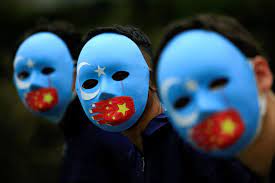Author: Murat Yılmaz
Affiliation: INSAMER
Organization/Publisher: INSAMER
Date/Place: October 6, 2020/Istanbul, Turkey
Type of Literature: Report
Number of Pages: 140
Link: https://insamer.com/en/concentration-camps-in-east-turkistan-step-by-step-genocide_3362.html
Keywords: East Turkistan, Uighur, China, Human Rights, Genocide, International law
Brief:
The detailed report amplifies the voice of the Uighurs, a persecuted community in East Turkistan—what China calls as Xinjiang province in the country’s west. The report states that in terms of rights and freedoms there is no other community in the world which is in a more difficult position than the Muslim people of East Turkistan, referring to Chinese Communist Party official Chen Quanguo who began to send the Uighurs in East Turkistan to concentration camps in 2016. China claims the camps are compulsory “Vocational Education and Training Centers.” The report details how those among the Uighur community devoted to religion are treated as “terrorists,” forced to eat pork and drink alcohol, and denied their beliefs and values while their psychological and moral values are destroyed. It was because of Kazakh-Turks that the world came to know how China was treating Uighurs, after the Kazakh-Turks were also detained in the concentration camps. After Kazakhstan-based relatives of these detainees did not hear from those in East Turkistan, they petitioned the Ministry of Foreign Affairs of Kazakhstan which led Kazakhstan to take action. Arguing why there is a need to stand up against China’s expansion into East Turkistan, the report details China’s use of the following oppressive methods: concentration camps including arbitrary use of power, systematic removal of freedom, the defamation of culture and beliefs, ideological repression, dehumanization, harassment, torture, murder and genocide. China fast-tracked its new plan for East Turkistan after Chen Quanguo was sent to the region in 2016. In less than a year, he appointed 90,866 policemen and established 7,500 new police stations by July 2017. The report also identifies that independent journalists, activists, NGOs and independent delegations are denied entrance to these camps to do research or observation because Article 103 of the Criminal Code of the People’s Republic of China stipulates that any activity which is considered to “explicitly provoke separatism and seek to divide the country” should be punished.
By: Riyaz ul Khaliq, CIGA Non-Resident Research Associate




